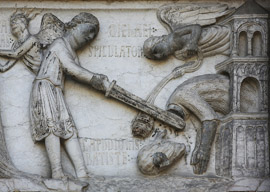
July 30, 2016

Beheading of St. John the Baptist on the baptistery from Benedetto Antelami. Parma, Italy
Source: Bigstock
However, even this experience was not enough give pause, at least not for long, to philosophers who deny that life is best treated as sacred or, if not sacred in the strictest religious sense, as if it were so. By strange coincidence I was reading a short philosophical book a few days before Satoshi Uematsu took to the knife, a book in which I read the following, written by a professor of philosophy at a prestigious institution:
To tell the truth, the inner lining of a belief in the sanctity of life is pretty ragged, ugly-looking and intolerant. If life possesses intrinsic value”and for the purposes of argument, let’s restrict this to human life”then this entails that all forms of life possess such value and it is not permitted in any circumstances to take a human life.
“Here, here!” one can almost hear Satoshi Uematsu cry in response.
Would not the following sentence seem right to most decent people?
To tell the truth, the inner lining of a disbelief in the sanctity of human life is pretty ragged, ugly-looking and intolerant.
It seems to me to be the mark of an adolescent to think, as the author of the passage cited above appears to think, that if you regard life as sacred, particularly but not exclusively human life, then you are morally prohibited from picking and eating a cabbage. Indeed, it requires many years of education and training to believe such a thing. A similar number of years, perhaps, as it took Satoshi Uematsu to come to the conclusion that the residents of the home whom he killed were better off dead from everyone’s point of view, and that it was incumbent upon him, on society’s behalf, to kill them.
As I have mentioned, he was 26 years of age”about the time a student of philosophy might expect to receive, or to achieve, his doctorate.